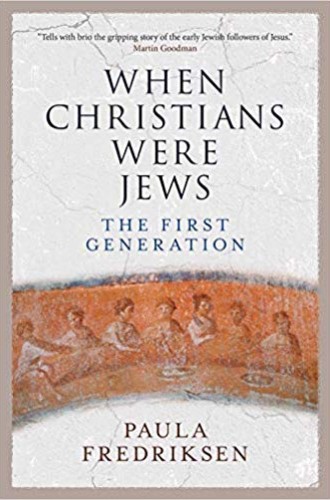Jesus’ earliest followers were Jewish, too
Paula Fredriksen challenges popular assumptions about the first generation of Christians.
The first generation of Jesus’ followers were Scripture-reading Jews who believed that Jesus’ life, death, and resurrection were fulfillments of prophetic predictions that a messiah would one day appear upon the earth, and that his arrival would herald the coming end time. These early devotees of Jesus faced pressing questions about their relationship with fellow Jews who rejected the notion that Jesus was the long-awaited Messiah. Would Jesus’ falling-out with Pharisees, Sadducees, and other Jews affect their relationship with these Jews? Even more pressingly, should Jesus’ followers expect gentile newcomers to their community to live squarely within the Jewish community by adopting Jewish rituals such as circumcision and the observation of dietary laws?
As these questions were being hotly debated through the second half of the first century, most of Jesus’ followers viewed themselves as devout Jews. Even disciples like Paul, who insisted that gentiles were not obligated to observe Jewish laws, did not perceive the followers of Jesus as an entity that existed outside of Judaism. While later church fathers would depict Christianity and Judaism as orbiting outside of and in tension with one another, these religious communities remained intertwined until at least the fourth century. The interconnectedness of Christianity and Judaism came to an end only after Constantine legalized Christianity and Christian bishops began to assemble councils with the intention of constructing a uniform Christian doctrine.
Read our latest issue or browse back issues.
Increased sensitivity to the fact that Christianity did not split from Judaism immediately following Jesus’ death has propelled scholars to dig beneath the surface of ancient texts to better understand what lay at the core of Jesus’ debates with his Jewish interlocutors. Their work has provided an important corrective to the traditional presumption that Jesus worked against first-century Jewish life rather than within it. More recently, scholars have begun to emphasize Paul’s Jewish identity, challenging the long-standing notion that Paul was the law-hating, gentile-befriending apostle that many have taken him for.
Paula Fredriksen makes a significant contribution to the corpus of scholarship on the early years of Jesus discipleship in its Jewish context. Beginning with the presumption that Jesus’ early followers thought of his life and imminent return in Jewish terms, Fredriksen reconstructs the circumstances in which the apostles set about interpreting Jesus’ teachings and disseminating his message.
The first two chapters of When Christians Were Jews debunk the widespread assumption that Jesus’ followers rejected the Temple as the locus of divine presence and the authority of its priestly administrators. This assumption has enforced a theological misconception: that Judaism prioritizes a leadership hierarchy based on who is empowered to administer its sacred space, while Christianity democratizes divine worship by decentralizing sacred space.
Fredriksen challenges this assumption by elegantly showing that early Christians acknowledged the sanctity of the Temple and the authority of its administrators. In fact, the only body of late Second Temple documents which overtly reject the authority of the Temple is the literature of the Dead Sea sect, whose members withdrew from Jerusalem and protested against the jurisdictive authority of Temple administrators.
Fredriksen then tackles the question of what distinct sociological and theological elements enabled Jesus’ small group of disciples to endure and ultimately to thrive, even in the absence of their Messiah. The rapid growth of this community is especially remarkable given the myriad messianic figures who preached publicly and enjoyed the support of large followings in the first century.
For Fredriksen, the key to understanding how this community endured and ultimately thrived lies in its focus on stories about Jesus’ death and return as signifiers that Jesus was the true Messiah. Jesus’ disciples affirmed their witness to his death and return by prophesying, exorcizing demons, and engaging in other acts of healing. They also adapted their sacred scriptures to their new circumstances by interpreting prophetic visions as predictions of Jesus’ life, death, and resurrection—and as instructions to embark on a mission which would prepare them for the coming end time.
One of Fredriksen’s guiding questions is how the early followers of Jesus remained cohesive even when, despite their expectations, the end time did not arrive during their lifetimes. The author of Luke and Acts addresses this disappointment by downplaying Jesus’ eschatology and moving away from the notion of an imminent messianic redemption. Other early devotees reformulated Jesus’ teachings as predictors of devastating watershed moments that had already happened: the fall of the Temple and the Roman conquest of Jerusalem.
For the Gospel of Mark, this meant that the end time was never intended to come immediately following Jesus’ death but rather would be fulfilled shortly after the writing of the Gospel. The end of days which Paul insisted was on the horizon had indeed been galvanized, not by explicit miracles signaling divine intervention, but by the Roman Empire, which had vanquished Jerusalem and its inhabitants. Fredriksen thus ably demonstrates that the earliest followers of Jesus coped with unmet eschatological expectations by pivoting in new directions which enabled the nascent community to cope with a rapidly changing reality.
When Christians Were Jews is an inviting introduction into this important period that will stimulate and challenge readers of all backgrounds and faith traditions.






